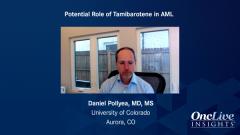
Supplements and Featured Publications
- Research Efforts Underway for RARA+ MDS and AML
- Volume 1
- Issue 1
Venetoclax and HMA Resistance in Patients with AML
Dr Daniel Pollyea discusses the role of venetoclax plus an HMA agent in patients with AML and talks about some possible mechanisms of resistance to the venetoclax-HMA combination.
Daniel Pollyea, MD, MS: The use of venetoclax plus an HMA [hypomethylating agent] in AML [acute myeloid leukemia] has been revolutionary. This is the standard of care for a patient who’s newly diagnosed and so-called unfit-for-intensive-chemotherapy. This is increasingly being in other areas as well. For younger fit patients who have disease biology that would be associated with a worse response to standard conventional treatment, or in the relapsed/refractory setting, this is often used off-label. This regimen has really expanded. In just a few years, it’s become a mainstay of the treatment for AML.
Even though we’re very optimistic about the outcomes with venetoclax plus HMA in patients with AML, not everyone responds or has a good outcome. A percentage of patients are refractory, and the majority of responders will ultimately relapse. The community is working really hard to ascertain which factors might be associated with a poor or worsening response to a venetoclax-based regimen. Our group, as well as some others, recently showed that the leukemia cells that arrest at a more mature stage of maturation, the monocytic stage or phase, are more resistant to venetoclax-based regimens. It’s been an observation. It’s also possible that upregulation of MCL1 can overcome resistance to venetoclax, which is a BCL2 inhibitor. We’ve also seen that mutations in TP53, and perhaps FLT3, are associated with suboptimal outcomes with this regimen. Those are all potential predictors of suboptimal outcomes to this regimen. We also think RAS mutations could go into that category; a lot of work is being done in this area. We’re learning a lot, but we all need to learn more.
Transcript edited for clarity.
Articles in this issue
almost 3 years ago
Dr Alfonso Piérola on Unmet Needs in Higher-Risk MDSalmost 3 years ago
Dr Borthakur on the SELECT MDS-1 Trial in Newly Diagnosed MDSover 3 years ago
Future Perspectives in Higher-Risk MDSover 3 years ago
SELECT-MDS-1: Review of Study Design and Objectives






































